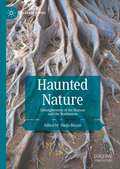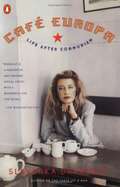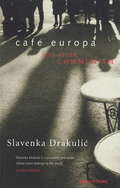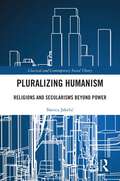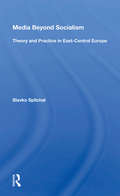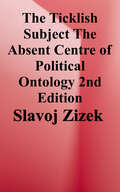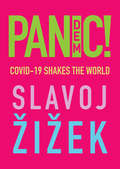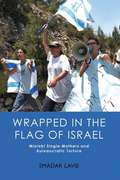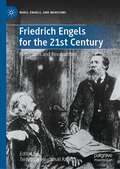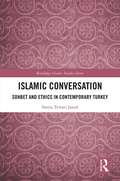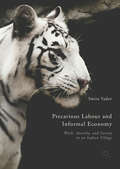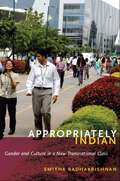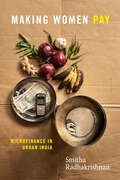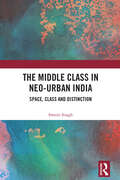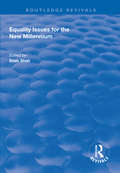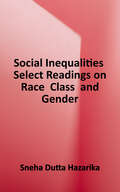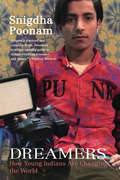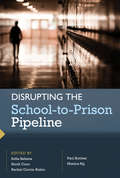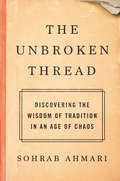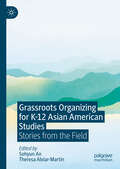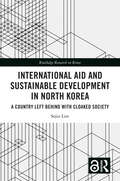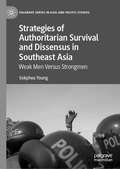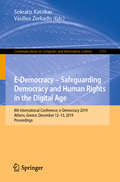- Table View
- List View
Haunted Nature: Entanglements of the Human and the Nonhuman (Palgrave Gothic)
by Sladja BlazanThis volume is a study of human entanglements with Nature as seen through the mode of haunting. As an interruption of the present by the past, haunting can express contemporary anxieties concerning our involvement in the transformation of natural environments and their ecosystems, and our complicity in their collapse. It can also express a much-needed sense of continuity and relationality. The complexity of the question—who and what gets to be called human with respect to the nonhuman—is reflected in these collected chapters, which, in their analysis of cinematic and literary representations of sentient Nature within the traditional gothic trope of haunting, bring together history, race, postcolonialism, and feminism with ecocriticism and media studies. Given the growing demand for narratives expressing our troubled relationship with Nature, it is imperative to analyze this contested ground.
Cafe Europa: Life after Communism
by Slavenka DrakulicA collection of essays that explore life in various Eastern European countries since the fall of communism.
Café Europa: Life After Communism
by Slavenka DrakulicEurope is still a divided continent. In the place of a fallen Berlin wall, there is a chasm between the East and the West. Are these differences a communist legacy, or do they run even deeper? What divides us today? To say simply that it is the understanding of the past, or a different concept of time, is not enough. But a visitor to this part of the world will soon discover that we, the Eastern Europeans, live in another time zone. We live in the twentieth century, but at the same time we inhabit a past full of myths and fairy tales, of blood and national belonging, and the fact that most people are lying and cheating or that they have the habit of blaming others for every failure...'An intimate tour of life on the streets of Budapest, Tirana, Warsaw and Zagreb, as those cities continue to acclimatise to the post-Communist thaw, Café Europa does not provide easy solutions or furnish political pallatives. Rather as a Croatian with a viewpoint of ever-widening relevance, the value of Slavenka Drakulic's wry and humane observations lie in the emotional force of their honesty and the clarity of their insight.....
Pluralizing Humanism: Religions and Secularisms Beyond Power (Classical and Contemporary Social Theory)
by Slavica JakelićHumanism is appealed to today whenever we want to tackle the conditions of dehumanization in the contemporary world. But for humanism to be viable in the twenty first century, this book argues, it needs to be pluralized.Employing theoretical, historical, and sociological arguments, this book moves beyond the discourse of critique. It engages theories of religion and secularism, as well as postmodern, postcolonial, and decolonial critiques of Western humanist projects, to uncover the ideas and practices of religious and secular humanisms when they challenge dehumanization in the pursuit of conditions of flourishing for all. Through studies of the Solidarity movement in Poland and the anti-apartheid movement in South Africa, the book demonstrates the centrality of humanist traditions to the emergence of religious-secular solidarities that transformed the political landscapes of the world. By highlighting the instances in which humanisms functioned as checks on each other’s absolutist claims, the book contends that humanisms supply a constructive path for addressing the challenges of our time—a time of radically divided societies and intolerant, even violent, forms of nationalism. A challenge to the critiques of humanism that seek to identify it solely as the legacy of the West, as anti-religious discourse, or relegate it to the domain of power constellations, Pluralizing Humanism highlights the rich plurality of humanist discourses and the need for their mutual engagements. It points to humanist ideals as constitutive of politics that can guide our human power because they are irreducible to it.As such, this book will appeal to social scientists, social theorists, religious studies scholars, and ethicists with interests in religion, secularism, social movements, and humanist thought and practice.
Media Beyond Socialism: Theory And Practice In East-Central Europe
by Slavko SplichalMedia Beyond Socialism treats the changing relationships among media, state, economy, and civil society in the current period of transition in East Europe from socialism to the establishment of Western-type democracies. Analyzing the relevance of mass communication and particularly of the media in the democratization process, the book addresses suc
The Ticklish Subject: The Absent Centre of Political Ontology (The Essential Zizek Series)
by Slavoj ZizekSlavoj Zizek, the maverick philosopher, author of over 30 books, acclaimed as the "Elvis of cultural theory", and today's most controversial public intellectual. His work traverses the fields of philosophy, psychoanalysis, theology, history and political theory, taking in film, popular culture, literature and jokes--all to provide acute analyses of the complexities of contemporary ideology as well as a serious and sophisticated philosophy. His recent films The Pervert's Guide to the Cinema and Zizek! reveal a theorist at the peak of his powers and a skilled communicator. <p><p>Now Verso is making his classic titles, each of which stand as a core of his ever-expanding life's work, available as new editions. Each is beautifully re-packaged, including new introductions from Zizek himself. Simply put, they are the essential texts for understanding Zizek's thought and thus cornerstones of contemporary philosophy. <p><p>The Ticklish Subject: The Absent Centre of Political Ontology: A specter is haunting Western thought, the specter of the Cartesian subject. In this book Slavoj Zizek unearths a subversive core to this elusive specter, and finds within it the indispensable philosophical point of reference for any genuinely emancipatory project.
Pandemic!: COVID-19 Shakes the World
by Slavoj iekAs an unprecedented global pandemic sweeps the planet, who better than the supercharged Slovenian philosopher Slavoj i ek to uncover its deeper meanings, marvel at its mind-boggling paradoxes and speculate on the profundity of its consequences? We live in a moment when the greatest act of love is to stay distant from the object of your affection. When governments renowned for ruthless cuts in public spending can suddenly conjure up trillions. When toilet paper becomes a commodity as precious as diamonds. And when, according to i ek, a new form of communism – the outlines of which can already be seen in the very heartlands of neoliberalism – may be the only way of averting a descent into global barbarism. Written with his customary brio and love of analogies in popular culture (Quentin Tarantino and H. G. Wells sit next to Hegel and Marx), i ek provides a concise and provocative snapshot of the crisis as it widens, engulfing us all.
Wrapped In The Flag Of Israel
by Smadar LavieWhat is the relationship between social protest movements in the State of Israel, violence in Gaza, and the possibility of an Israeli attack on Iran? Why did the mass social protests in the State of Israel of summer 2011 ultimately fail? Wrapped in the Flag of Israel discusses social protest movements from the 2003 Single Mothers' March led by Mizrahi Vicky Knafo, to the "Tahrir is Here" Israeli mass protests of summer 2011. Equating bureaucratic entanglements with pain--what, arguably, can be seen as torture, Smadar Lavie explores the conundrum of loving and staying loyal to a state that repeatedly inflicts pain on its non-European Jewish women citizens through its bureaucratic system. The book presents a model of bureaucracy as divine cosmology and posits that Israeli State bureaucracy is based on a theological essence that fuses the categories of religion, gender, and race into the foundation of citizenship.
Friedrich Engels for the 21st Century: Reflections and Revaluations (Marx, Engels, and Marxisms)
by Terrell Carver Smail RapicThis edited volume presents an interdisciplinary and international revaluation of Friedrich Engels as much more than “junior partner” to Karl Marx or “second fiddle” in the Marxist orchestra. The nineteen critical essays in this collection are the work of scholars from Germany, USA, UK, Italy, China, India, Mexico and the Philippines. Together they present and evaluate archival material and scholarly commentary that covers epistemology, political economy, political theory, gender studies, cultural studies, political geography, philosophy of social science and sociological studies of class-conflict. Students, activists and specialists will find fresh consideration of familiar works, such as The Condition of the Working Class in England, The Origin of the Family, Private Property and the State, and The Dialectics of Nature. They will also be able to explore Engels’s less familiar pamphleteering, literary criticism and political commentary through detailed contextualization and careful analysis. Friedrich Engels for the 21st Century: Perspectives and Problems is unique in putting different intellectual and political receptions of Engels’s work into productive conversation, particularly from non-Anglophone scholars, translated here into English. Readers will appreciate why Engels has been so widely celebrated some two hundred years after his birth.
Islamic Conversation: Sohbet and Ethics in Contemporary Turkey (Routledge Islamic Studies Series)
by Smita Tewari JassalThe book evaluates on-going ethical conversations to learn how emotional communication is received, teachings are internalized, and a religious world-view is brought to life. Exploring how religious values saturate people’s consciousness to induce subtle shifts in moral and ethical sensibilities, this book is about people’s practices that illuminate how Islam is lived. Based on fieldwork conducted in Ankara between 2010 and 2016, the study enquires into people’s ethical, religious, and moral motivations through the use of the ethnographic method and "thick description". Conversations and interviews with officials, community leaders, students, entrepreneurs, professionals, and blue-collar workers were subjected to close scrutiny to foreground societal change and churning. To capture perspectives absent or deliberately overlooked in mainstream public discourse and scholarship, fieldwork was conducted in locations ranging from homes, offices, and university dorms to the shrines of saints. In listening closely to how people talk about their religious practices, the book addresses the question of how Islamic subjectivities are being forged in Turkey. The study unveils how people are pushed to re-think old practices and attitudes in the process of reinterpreting Islam in light of contemporary concerns. Filling a gap in the literature where micro-level, grounded analyses of culture and society are relatively rare, this book is a key resource for readers interested in the anthropology of religion and gender, ethnography, Turkey, and the Middle East.
Precarious Labour and Informal Economy: Work, Anarchy, and Society in an Indian Village
by Smita YadavAn empirical account of one of India’s largest indigenous populations, this book tells the story of the Gonds—who currently face displacement and governmental control of the region’s forests, which has crippled their economy. Rather than protesting and calling for state intervention, the Gonds have turned toward an informal economy: they not only engage with flexible forms of work, but also bargain for higher wages and experience agency and autonomy. Smita Yadav conceives of this withdrawal from the state in favour of precarious forms of work as an expression of anarchy by this marginalized population. Even as she provides rich detail of the Gonds’ unusual working lives, which integrate work, labour, and debt practices with ideologies of family and society, Yadav illustrates the strength required to maintain dignity when a welfare state has failed.
Appropriately Indian: Gender and Culture in a New Transnational Class
by Smitha RadhakrishnanAppropriately Indian is an ethnographic analysis of the class of information technology professionals at the symbolic helm of globalizing India. Comprising a small but prestigious segment of India's labor force, these transnational knowledge workers dominate the country's economic and cultural scene, as do their notions of what it means to be Indian. Drawing on the stories of Indian professionals in Mumbai, Bangalore, Silicon Valley, and South Africa, Smitha Radhakrishnan explains how these high-tech workers create a "global Indianness" by transforming the diversity of Indian cultural practices into a generic, mobile set of "Indian" norms. Female information technology professionals are particularly influential. By reconfiguring notions of respectable femininity and the "good" Indian family, they are reshaping ideas about what it means to be Indian. Radhakrishnan explains how this transnational class creates an Indian culture that is self-consciously distinct from Western culture, yet compatible with Western cosmopolitan lifestyles. She describes the material and symbolic privileges that accrue to India's high-tech workers, who often claim ordinary middle-class backgrounds, but are overwhelmingly urban and upper caste. They are also distinctly apolitical and individualistic. Members of this elite class practice a decontextualized version of Hinduism, and they absorb the ideas and values that circulate through both Indian and non-Indian multinational corporations. Ultimately, though, global Indianness is rooted and configured in the gendered sphere of home and family.
Making Women Pay: Microfinance in Urban India
by Smitha RadhakrishnanIn Making Women Pay, Smitha Radhakrishnan explores India's microfinance industry, which in the past two decades has come to saturate the everyday lives of women in the name of state-led efforts to promote financial inclusion and women's empowerment. Despite this favorable language, Radhakrishnan argues, microfinance in India does not provide a market-oriented development intervention, even though it may appear to help women borrowers. Rather, this commercial industry seeks to extract the maximum value from its customers through exploitative relationships that benefit especially class-privileged men. Through ethnography, interviews, and historical analysis, Radhakrishnan demonstrates how the unpaid and underpaid labor of marginalized women borrowers ensures both profitability and symbolic legitimacy for microfinance institutions, their employees, and their leaders. In doing so, she centralizes gender in the study of microfinance, reveals why most microfinance programs target women, and explores the exploitative implications of this targeting.
The Middle Class in Neo-Urban India: Space, Class and Distinction
by Smriti SinghThis book critically examines the new middle class and the emergence of neo-urban spaces in India within the context of rapid urbanisation and changing socio-spatial dynamics in urban areas in the country. It looks at class as a socio-spatial category where class distinction is tied to and manifests itself through the space of the city. With a detailed ethnographic study of the national capital region of Delhi, especially Gurugram, it explores themes such as class subjectivity, morality and social beliefs; life inside gated enclaves; family and everyday practices of class reproduction; and the process of othering and exclusivity, among others. Class identity, vulnerability and hierarchy influence the actions and motivations of the middle class. The author studies the nuances and socio-political fractures stemming from the complex dynamic of class, caste, religion and gender that manifest in these neo-urban spaces and how these shape the city and community. Rich in empirical resources, this book will be of interest to scholars and researchers of sociology, political sociology, ethnography, urban sociology, urban studies and South Asian studies.
Equality Issues for the New Millennium (Routledge Revivals)
by Sneh ShahFirst published in 2000, this volume is taking stock of equality issues in higher education as we move into the new millennium. It is clear that many positive developments in the 1970s and 1980s have been lost. However, the way forward is not just to reinstate these developments. This book focuses on a number of challenges, including bringing equality issues from the periphery to the centre of education, seeking an overarching framework such as human rights to ensure that equality is interpreted in a more comprehensive and systematic way, including every individual in the deliberations about equality, and accepting that an acknowledgement of the 'needs' of specific groups of students has to be paralleled with educating everyone about their responsibilities in relation to the causes and consequences of inequality. Fifteen educationalists, from a number of higher education institutions, have analyzed their particular area of work in equality, providing the clear message that in the new millennium equality must become truly embedded in real education.
Social Inequalities: Select Readings on Race, Class, and Gender
by Sneha Dutta HazarikaFeaturing an intersectional approach, this text introduces students to social inequalities embedded within society at both the micro and macro level. Through compelling, scholarly articles, students gain the knowledge necessary to address social inequalities and inspire social change. The anthology features six distinct units. <p><p>Unit I focuses on race, racism, and immigration and features readings on racial formation, defining racism, and the consequences of racism on U.S. immigration policy. In Unit II, students read about gender, patriarchy, and formal and informal discrimination against women at work. Unit III features coverage of social class, power, and privilege, and Unit IV speaks to the tensions between wealth, privilege, and inequality. Students learn about inequality and discrimination within social institutions like schools, housing, and mass incarceration. The final unit encourages students to pursue social change and social transformation. <p><p>This book is an ideal reader for courses in sociology, women and gender studies, and race and ethnic studies, as well as those that address social stratification and the intersectionality of race, ethnicity, class, and gender.
Haunted Nations: The Colonial Dimensions of Multiculturalisms (Transformations)
by Sneja GunewPostcolonialism has attracted a large amount of interest in cultural theory, but the adjacent area of multiculturalism has not been scrutinised to quite the same extent. In this innovative new book, Sneja Gunew sets out to interrogate the ways in which the transnational discourse of multiculturalism may be related to the politics of race and indigeneity, grounding her discussion in a variety of national settings and a variety of literary, autobiographical and theoretical texts. Using examples from marginal sites - the "settler societies" of Australia and Canada - to cast light on the globally dominant discourses of the US and the UK, Gunew analyses the political ambiguities and the pitfalls involved in a discourse of multiculturalism haunted by the opposing spectres of anarchy and assimilation.
Dreamers: How Young Indians Are Changing the World
by Snigdha PoonamSnigdha Poonam traveled through towns in northern India to investigate millennials, who are nothing like their Western counterparts. In a country of exceptional ambition, crushing limitations, and toxic masculinity, she found clickbaiters, scammers, and hucksters, but also strivers and student leaders hungry for change—a generation of dreamers.
Disrupting the School-to-Prison Pipeline (HER Reprint Series)
by SofÍa BahenaA trenchant and wide-ranging look at this alarming national trend, Disrupting the School-to-Prison Pipeline is unsparing in its account of the problem while pointing in the direction of meaningful and much-needed reforms.The &“school-to-prison pipeline&” has received much attention in the education world over the past few years. A fast-growing and disturbing development, it describes a range of circumstances whereby &“children are funneled out of public schools and into the juvenile and criminal justice systems.&” Scholars, educators, parents, students, and organizers across the country have pointed to this shocking trend, insisting that it be identified and understood—and that it be addressed as an urgent matter by the larger community.This new volume from the Harvard Educational Review features essays from scholars, educators, students, and community activists who are working to disrupt, reverse, and redirect the pipeline. Alongside these authors are contributions from the people most affected: youth and adults who have been incarcerated, or whose lives have been shaped by the school-to-prison pipeline. Through stories, essays, and poems, these individuals add to the book&’s comprehensive portrait of how our education and justice systems function—and how they fail to serve the interests of many young people."
The Unbroken Thread: Discovering the Wisdom of Tradition in an Age of Chaos
by Sohrab AhmariWe&’ve pursued and achieved the modern dream of defining ourselves—but at what cost? The New York Post op-ed editor makes a compelling case for seeking the inherited traditions and ideals that give our lives meaning.&“Ahmari&’s tour de force makes tradition astonishingly vivid and relevant for the here and now.&”—Rod Dreher, bestselling author of Live Not by Lies and The Benedict OptionAs a young father and a self-proclaimed &“radically assimilated immigrant,&” opinion editor Sohrab Ahmari realized that when it comes to shaping his young son&’s moral fiber, today&’s America comes up short. For millennia, the world&’s great ethical and religious traditions taught that true happiness lies in pursuing virtue and accepting limits. But now, unbound from these stubborn traditions, we are free to choose whichever way of life we think is most optimal—or, more often than not, merely the easiest. All that remains are the fickle desires that a wealthy, technologically advanced society is equipped to fulfill.The result is a society riven by deep conflict and individual lives that, for all their apparent freedom, are marked by alienation and stark unhappiness.In response to this crisis, Ahmari offers twelve questions for us to grapple with—twelve timeless, fundamental queries that challenge our modern certainties. Among them: Is God reasonable? What is freedom for? What do we owe our parents, our bodies, one another? Exploring each question through the life and ideas of great thinkers, from Saint Augustine to Howard Thurman and from Abraham Joshua Heschel to Andrea Dworkin, Ahmari invites us to examine the hidden assumptions that drive our behavior and, in so doing, to live more humanely in a world that has lost its way.
Grassroots Organizing for K-12 Asian American Studies: Stories from the Field
by Sohyun An Theresa Alviar-MartinThis edited book captures Asian American grassroot organizing in Georgia through counterstorytelling. Rooted in Critical Race Theory and traditions of narrative inquiry, counterstorytelling in educational research seeks to challenge dominant narratives by centering marginalized communities’ experiences and perspectives as sources of valuable knowledge. By employing AsianCrit, global citizenship education, human rights, and liberatory postcolonial education as theoretical lenses, the editors of this book interrupt essentialized portrayals of Asian Americans by featuring stories of Asian American students, parents, and educators who are fighting for Asian American Studies and Ethnic Studies in K-12 schools in Georgia. Their stories capture common as well as divergent experiences of being Asian American in the South and illuminate possibilities, challenges, and complexity of grassroots organizing for Asian American studies and ethnic studies in the South.
International Aid and Sustainable Development in North Korea: A Country Left Behind with Cloaked Society (Routledge Research on Korea)
by Sojin LimThis book examines international aid in North Korea, in particular the ongoing policy of withholding aid, through the lens of the impact on the general population to present an argument for sustainable development. Focusing on the human rights of North Koreans and presenting a case for the use of aid as a provision for social change, it explores an alternative narrative to the existing long-drawn-out rhetoric of ‘denuclearisation-first’. The book’s scope includes evaluations of the causes of international sanctions and their impact, the Kim regime’s mitigation of sanctions through marketisation and a digital economy as well as barriers to aid monitoring and the reason for the absence of any mass anti-regime movement. It also posits that North Korea is a fragile state but cloaked by the image of a strong regime. The book succinctly demonstrates that the key to unlocking the potential of North Korea’s ‘cloaked society’ does not lie in sanctions, but is to be found in engagement with development aid. As such it will appeal to students of Korean Studies, Development Studies, Asian Politics and International Relations.
International Aid and Sustainable Development in North Korea: A Country Left Behind with Cloaked Society (Routledge Research on Korea)
by Sojin LimThis book examines international aid in North Korea, in particular the ongoing policy of withholding aid, through the lens of the impact on the general population to present an argument for sustainable development.Focusing on the human rights of North Koreans and presenting a case for the use of aid as a provision for social change, it explores an alternative narrative to the existing long-drawn-out rhetoric of ‘denuclearisation-first’. The book’s scope includes evaluations of the causes of international sanctions and their impact, the Kim regime’s mitigation of sanctions through marketisation and a digital economy as well as barriers to aid monitoring and the reason for the absence of any mass anti-regime movement. It also posits that North Korea is a fragile state but cloaked by the image of a strong regime.The book succinctly demonstrates that the key to unlocking the potential of North Korea’s ‘cloaked society’ does not lie in sanctions, but is to be found in engagement with development aid. As such it will appeal to students of Korean Studies, Development Studies, Asian Politics and International Relations.The Open Access version of this book, available at http://www.taylorfrancis.com, has been made available under a Creative Commons [Attribution-Non Commercial-No Derivatives (CC-BY-NC-ND)] 4.0 license.
Strategies of Authoritarian Survival and Dissensus in Southeast Asia: Weak Men Versus Strongmen (Palgrave Series in Asia and Pacific Studies)
by Sokphea YoungThis book analyses how authoritarian rulers of Southeast Asian countries maintain their durability in office, and, in this context, explains why some movements of civil society organizations succeed while others fail to achieve their demands. It discusses the relationship between the state-society-business in the political survival context. As the first comparative analysis of strategies of regime survival across Southeast Asia, this book also provides an in-depth insight into the various opposition movements, and the behaviour of antagonistic civic and political actors in the region.
E-Democracy – Safeguarding Democracy and Human Rights in the Digital Age: 8th International Conference, e-Democracy 2019, Athens, Greece, December 12-13, 2019, Proceedings (Communications in Computer and Information Science #1111)
by Sokratis Katsikas Vasilios ZorkadisThis book constitutes the refereed proceedings of the 8th International Conference on E-Democracy, E-Democracy 2019, held in Athens, Greece, in December 2019.The 15 revised full papers presented were carefully selected from 27 submissions. The papers are organized in topical sections on rrivacy and data protection; e-government; e-voting and forensics; online social networks and "fake news".
